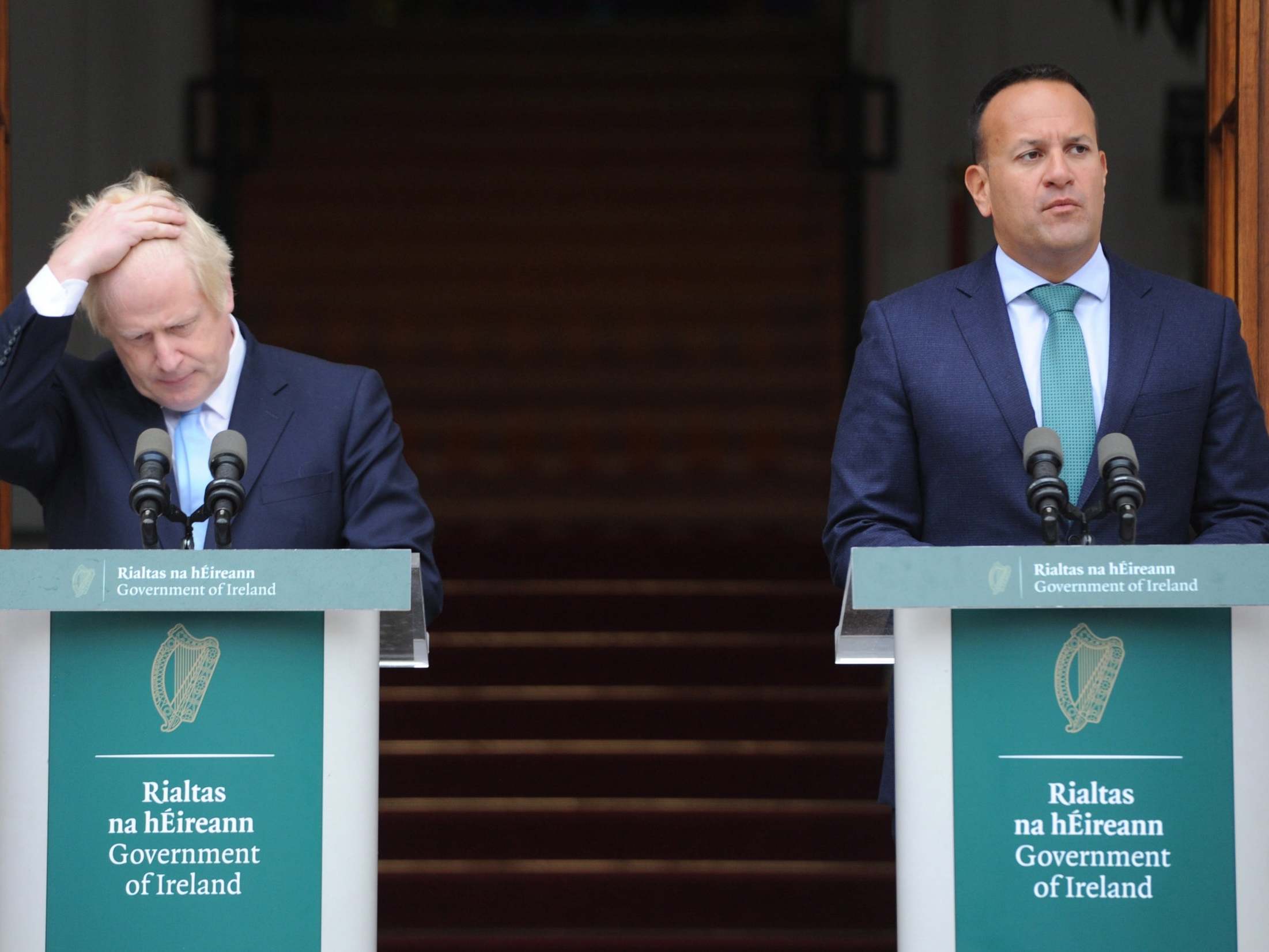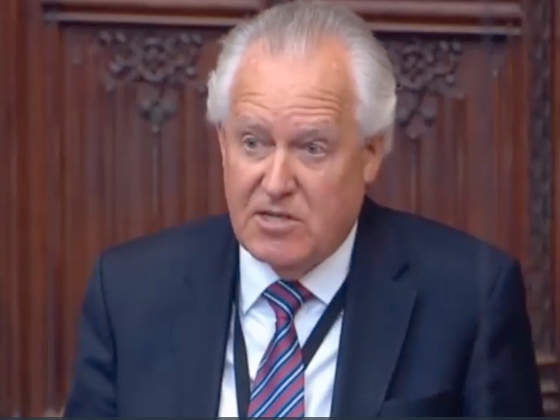Leo Varadkar confronts Boris Johnson with withering assessment of his Brexit strategy in strained joint press conference
Leaders admit there will be no breakthrough in talks in Dublin today
Your support helps us to tell the story
From reproductive rights to climate change to Big Tech, The Independent is on the ground when the story is developing. Whether it's investigating the financials of Elon Musk's pro-Trump PAC or producing our latest documentary, 'The A Word', which shines a light on the American women fighting for reproductive rights, we know how important it is to parse out the facts from the messaging.
At such a critical moment in US history, we need reporters on the ground. Your donation allows us to keep sending journalists to speak to both sides of the story.
The Independent is trusted by Americans across the entire political spectrum. And unlike many other quality news outlets, we choose not to lock Americans out of our reporting and analysis with paywalls. We believe quality journalism should be available to everyone, paid for by those who can afford it.
Your support makes all the difference.Britain has so far put forward no alternative proposals for the Irish border which would permit Dublin to give up the backstop, Taoiseach Leo Varadkar has said, in comments pouring cold water on Boris Johnson’s claims that progress is being made towards a Brexit deal.
Mr Varadkar was speaking at a frosty press conference with the prime minister ahead of talks in the Irish capital at which both leaders admitted there would be no breakthrough.
Mr Johnson repeated his commitment to take Britain out of the EU by 31 October, despite legislation set to become law today barring him from doing so unless he has a deal with Brussels or Commons approval for no deal.
The PM struck a defiant note in response to MPs’ efforts to stop him crashing the UK out without agreement on Halloween: “I am absolutely undaunted by whatever may take place in parliament, because I think what the British people want us to do is to deliver a deal and to get on and take us out on 31 October.”
Mr Johnson – who at one point inadvertently said that Angela Merkel had suggested it might take “30 years” rather than “30 days” to reach a Brexit agreement – admitted that a no-deal outcome would be “a failure of statecraft” and said he would “overwhelmingly prefer” a deal.
And he appeared to waver on the issue of the backstop, saying: "I think the landing zone (for a deal) is clear to everybody. We need to find a way of ensuring that the UK is not kept locked in the backstop arrangement, so that there is a way out for the UK whilst giving Ireland the assurances it needs."
Mr Johnson's official spokesman later brushed off suggestions that the PM's comments amounted to accepting the need for a backstop so long as the UK is not permanently trapped in it, insisting that he still wants it removed entirely from the withdrawal deal.
Mr Varadkar said the EU27 would be ready to consider an extension to Brexit talks “if there is a good reason”, but added: “I think we would all prefer to have this resolved in October.”
He said the backstop – which provides insurance to keep the Irish border open until future trade relations are finalised – “continues to be a critical component of the withdrawal agreement unless and until alternatives are found”.
And he added: “We are open to alternatives, but they must be realistic ones, legally binding and workable, and we haven’t received such proposals to date.”
Mr Varadkar warned that advocates of a no-deal Brexit were wrong to suggest it would amount to a “clean break”. He warned Mr Johnson that even after the UK’s departure, it will be a “Herculean task” for Britain to strike free trade agreements with the remaining EU and the US within three years.

“In my view, the story of Brexit won’t end if the UK leaves the European Union on 31 October or even 31 January,” said the Irish premier.
“There’s no such thing as a clean break or ‘just getting it done’. Rather, we will just move on to a new phase. If there is no deal, it will cause severe disruption for British and Irish people alike – not so much on the continent.”
And he told Mr Johnson: “Whatever happens, we will have to get back to the negotiating table quite quickly and when we do the first items on the agenda will be citizens’ rights, the financial settlement and the Irish border – all issues which we had resolved in the withdrawal agreement reached by your predecessor.”
Mr Varadkar said a deal was “possible” but added that this would lead to “very tough” negotiations on issues like tariffs, fishing rights and state aid, which would then have to be ratified by 31 parties to any future trade agreement (FTA).
“Negotiating FTAs with the EU and the US and securing their ratification in less than three years is going to be a Herculean task for you, but we do want to be your friend and ally in doing so, and I think the manner in which you leave the European Union will determine if that is possible.”
Dismissing any prospect of Ireland giving up the backstop without legally-binding assurances to replace it, he told Mr Johnson: “What we cannot do and will not do is agree to the replacement of a legal guarantee with a promise.”
Mr Johnson said he had “an abundance of proposals” for alternatives to the backstop, but mentioned only previously-discussed ideas including trusted trader schemes and the maintenance of an all-Ireland animal health regime, which would involve drawing a customs border down the Irish Sea.
It was announced earlier today that the EU is running out of patience with the UK. A spokesperson for the European Commission told reporters in Brussels on Monday afternoon that the British government had not suggested how any replacement could actually work.
“At a point enough is enough,” Dutch trade minister Sigrid Kaag told newspaper Het Financieele Dagblad.
“At that stage the certainty of deterioration might be better than continuing without perspective. At a certain point there must be clarity. A good reason is needed for a new delay. What? It is difficult to say categorically.
“You have to see the context and see if there is a realistic expectation that this will lead to a follow-up phase. But so far, the British have not presented an alternative to the Brexit agreement that is already in place.”
Former Northern Ireland secretary Peter Hain, a leading supporter of the People’s Vote campaign for a second referendum, said: “Boris Johnson today claimed to have an ‘abundance’ of new proposals for how to avoid a hard border in Ireland, but yet again he couldn’t name a single one.

“Meanwhile he has cut the number of people working on negotiations with the EU in the Cabinet Office down to just four, and he hasn’t even bothered to visit the Northern Ireland border as either foreign secretary or as prime minister to see for himself the problems leaving the EU will create.
“The reality is clear – Johnson has no intention of trying to get a deal. Instead he is using every trick in the book to try to force through a destructive and undemocratic no deal which is the complete opposite of the ‘great deal’ he used to promise Britain would get.
“The Irish Taoiseach, Leo Varadkar, is quite right to say that the ‘clean-break Brexit’ Johnson speaks of is a total fantasy. Crashing out of the EU with no deal would resolve nothing, would put the UK in an extraordinarily weak negotiating position and would mean the endless Brexit crisis continuing for years and years to come.”

Join our commenting forum
Join thought-provoking conversations, follow other Independent readers and see their replies
Comments